-
 Bitcoin
Bitcoin $82,099.5826
-1.34% -
 Ethereum
Ethereum $1,817.9545
-1.07% -
 Tether USDt
Tether USDt $0.9999
0.02% -
 XRP
XRP $2.0815
-3.96% -
 BNB
BNB $595.8647
-1.53% -
 Solana
Solana $124.0327
-0.92% -
 USDC
USDC $1.0000
0.01% -
 Dogecoin
Dogecoin $0.1634
-3.94% -
 Cardano
Cardano $0.6445
-4.65% -
 TRON
TRON $0.2336
1.34% -
 Toncoin
Toncoin $3.9381
2.61% -
 Chainlink
Chainlink $13.2201
-3.75% -
 UNUS SED LEO
UNUS SED LEO $9.0947
-5.84% -
 Stellar
Stellar $0.2646
-1.90% -
 Avalanche
Avalanche $18.6234
-3.91% -
 Shiba Inu
Shiba Inu $0.0...01214
-3.88% -
 Sui
Sui $2.2126
-6.78% -
 Hedera
Hedera $0.1604
-6.61% -
 Polkadot
Polkadot $4.0237
-1.97% -
 Litecoin
Litecoin $82.1655
-4.48% -
 MANTRA
MANTRA $6.2849
-1.13% -
 Bitcoin Cash
Bitcoin Cash $298.8203
-2.66% -
 Dai
Dai $1.0000
0.02% -
 Bitget Token
Bitget Token $4.4293
-4.57% -
 Ethena USDe
Ethena USDe $1.0000
0.01% -
 Pi
Pi $0.6976
-9.77% -
 Hyperliquid
Hyperliquid $12.5853
-0.74% -
 Monero
Monero $215.4717
-0.22% -
 Uniswap
Uniswap $5.8825
-1.85% -
 Aptos
Aptos $5.1958
-2.29%
How to view transaction history in Trust Wallet?
To access your transaction history in Trust Wallet, open the app, select a cryptocurrency, and tap on the 'Transactions' or 'History' section for detailed records.
Mar 27, 2025 at 07:07 am
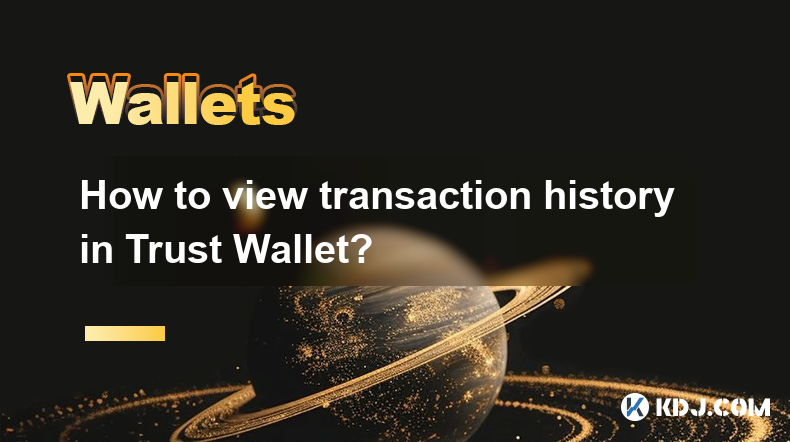
Accessing Your Transaction History
Trust Wallet, a popular mobile cryptocurrency wallet, provides a straightforward method to access your transaction history. This history details all incoming and outgoing transactions associated with your various wallets within the app. Knowing how to navigate this feature is crucial for managing your crypto assets effectively and for tracking your investments. Understanding this process allows you to verify successful transfers, monitor balances, and troubleshoot any potential issues.
Navigating the Trust Wallet Interface
First, open your Trust Wallet application on your mobile device. Ensure you've already logged in using your chosen security method, whether that's a password, biometric scan, or a passcode. The main screen typically displays your various cryptocurrency holdings. The location of the transaction history might vary slightly depending on the app version, but it's generally easy to find.
Locating the Transaction History Feature
To view your transaction history, you'll usually need to select a specific cryptocurrency wallet. Tap on the asset you want to review. Within that asset's individual wallet page, you'll find a section dedicated to the transaction history. This is often represented by an icon, typically showing a list or a chronological sequence. Sometimes, it's labelled explicitly as "Transactions," "History," or something similar. Look for visual cues or text indicating past activities.
Understanding the Transaction Details
Once you've accessed the transaction history, you'll see a list of your past transactions. Each entry will usually include key details:
- Date and Time: When the transaction occurred.
- Transaction Hash: A unique identifier for the transaction on the blockchain. This is crucial for verification.
- Sender Address: The address the funds were sent from. This will be your address for outgoing transactions.
- Recipient Address: The address the funds were sent to. This will be an external address for outgoing transactions.
- Amount: The quantity of cryptocurrency involved in the transaction.
- Status: Whether the transaction was successful, pending, or failed. A failed transaction might require further investigation.
Viewing Specific Transaction Details
To get more in-depth information about a specific transaction, simply tap on the transaction entry. This will usually open a detailed view. This expanded view often provides even more information, such as gas fees (for Ethereum-based transactions), confirmations, and potentially a link to a blockchain explorer where you can further verify the transaction. This detailed view ensures complete transparency and allows for thorough record-keeping.
Troubleshooting Potential Issues
If you're having trouble viewing your transaction history, there are a few things to check:
- Internet Connection: Ensure you have a stable internet connection. The app needs an active connection to retrieve your transaction data.
- App Version: Make sure you have the latest version of Trust Wallet installed. Updates often include bug fixes and improvements.
- Wallet Synchronization: Sometimes, the wallet might need to synchronize with the blockchain. Give it some time to fully update.
- Contact Support: If problems persist, contact Trust Wallet's customer support for assistance. They can help diagnose and resolve any technical issues.
Exporting Your Transaction History
While Trust Wallet doesn't directly offer a bulk export feature for your entire transaction history in a single file (like a CSV), you can manually record information from each transaction. This is particularly useful for tax reporting or personal record-keeping. Carefully copy the relevant details from each transaction shown in your history. Remember to record the date, amount, and the transaction hash for verification purposes.
Security Considerations
Always be mindful of security when using your Trust Wallet. Never share your seed phrase or private keys with anyone. Keep your device secure and use strong passwords or biometric authentication. Regularly update your Trust Wallet app to benefit from the latest security patches and improvements. Being proactive about security helps protect your crypto assets.
Understanding Blockchain Explorers
Transaction hashes are essential for independently verifying your transactions. You can use blockchain explorers to look up a transaction using its hash. These explorers are websites that provide a public record of all transactions on a particular blockchain. Simply paste the transaction hash into the explorer's search bar to view the transaction details independently. This provides an extra layer of verification and security.
Dealing with Pending Transactions
Occasionally, transactions may show as "pending." This means the transaction has been broadcast to the network but hasn't yet been confirmed by enough miners (or validators). The time it takes for a transaction to be confirmed varies depending on the network's congestion. Be patient and check back periodically. If a transaction remains pending for an unusually long time, consider contacting the relevant cryptocurrency exchange or service provider.
Gas Fees and Transaction Costs
For some blockchains like Ethereum, transactions incur gas fees. These fees are paid to miners for processing the transaction. The gas fee is usually displayed within the transaction details. Higher gas fees often lead to faster transaction confirmations, while lower fees might result in longer processing times. Understanding gas fees is crucial for budgeting your cryptocurrency transactions.
Frequently Asked Questions
Q: My transaction history is empty. What should I do?
A: Ensure your internet connection is stable, your wallet is synchronized, and you've selected the correct cryptocurrency wallet within Trust Wallet. If the problem persists, contact Trust Wallet support.
Q: How can I verify a transaction's authenticity?
A: Use the transaction hash to look up the transaction on a blockchain explorer. This will independently confirm the transaction details.
Q: What if a transaction fails?
A: Check the transaction details for the reason for failure. Contact the relevant exchange or service provider if needed. If funds were deducted but not received, contact Trust Wallet support immediately.
Q: Can I delete transactions from my history?
A: No, you cannot delete transactions from your Trust Wallet history. The blockchain maintains a permanent record of all transactions.
Q: How often does my transaction history update?
A: Your transaction history updates automatically as new transactions are confirmed on the blockchain. The frequency depends on the specific blockchain's confirmation times.
Disclaimer:info@kdj.com
The information provided is not trading advice. kdj.com does not assume any responsibility for any investments made based on the information provided in this article. Cryptocurrencies are highly volatile and it is highly recommended that you invest with caution after thorough research!
If you believe that the content used on this website infringes your copyright, please contact us immediately (info@kdj.com) and we will delete it promptly.
- The Crypto World Has Many Choices for Investors Who Want Safe Gains
- 2025-03-31 21:20:13
- Dogecoin (DOGE) Has a Turbulent Start to March, But Technical Indicators Hint at a Potential Bullish Turnaround
- 2025-03-31 21:20:13
- Dogecoin (DOGE) and Shiba Inu (SHIB) Whales Are Dumping to Buy Coldware (COLD)
- 2025-03-31 21:15:12
- Australia's financial crime regulator warns cryptocurrency ATM providers that many of these machines may be facilitating money laundering or defrauding victims
- 2025-03-31 21:15:12
- As Sui (SUI) Prepares to Unlock $151M, Coldware (COLD) Quietly Captures the Next Billion Users
- 2025-03-31 21:10:12
- Cryptocurrency investors are increasingly moving capital into stablecoins and tokenized real-world assets (RWAs)
- 2025-03-31 21:10:12
Related knowledge

How to easily generate a Bitcoin payment address
Mar 29,2025 at 10:49am
Generating a Bitcoin payment address might seem daunting, but it's actually quite straightforward. This process is crucial for receiving Bitcoin, as each transaction requires a unique address. Understanding how this works is fundamental to using Bitcoin effectively. This guide will walk you through the simple steps, regardless of your technical experti...
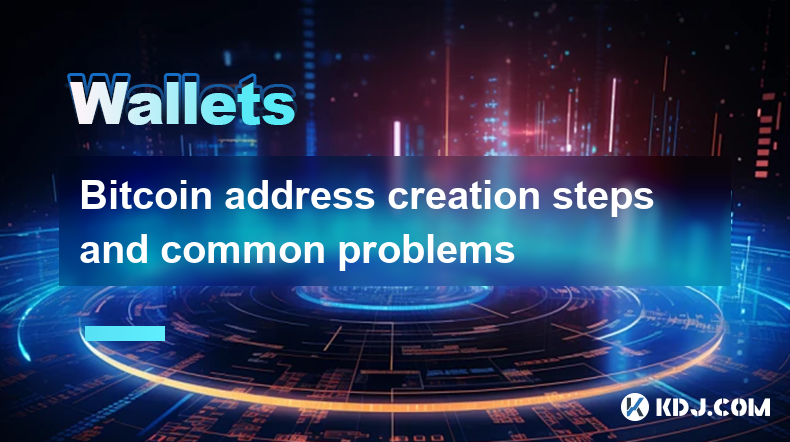
Bitcoin address creation steps and common problems
Mar 30,2025 at 06:07am
Understanding Bitcoin AddressesA Bitcoin address is a unique identifier, similar to a bank account number, used to receive Bitcoin. It's a string of alphanumeric characters generated from a public key, derived from your private key. Understanding the distinction between public and private keys is crucial for Bitcoin security. Your private key should be...
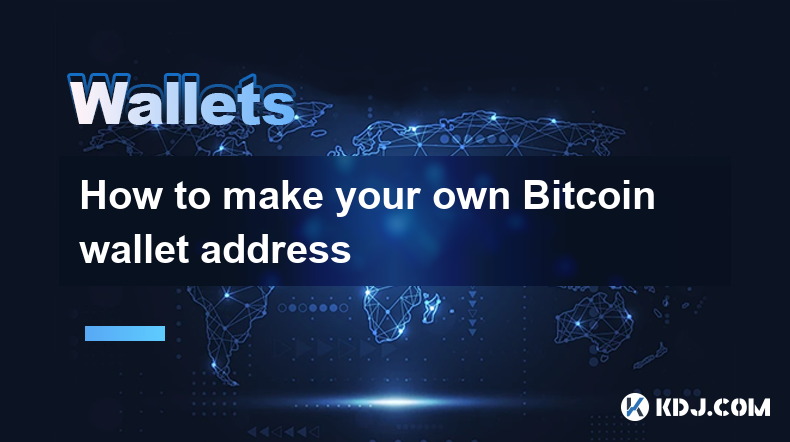
How to make your own Bitcoin wallet address
Mar 29,2025 at 08:42pm
Creating your own Bitcoin wallet address is crucial for securing and managing your Bitcoin holdings. It allows you to independently receive and send Bitcoin without relying on third-party services. This process involves understanding the different types of wallets and choosing the one that best suits your needs and technical expertise. Incorrectly gene...
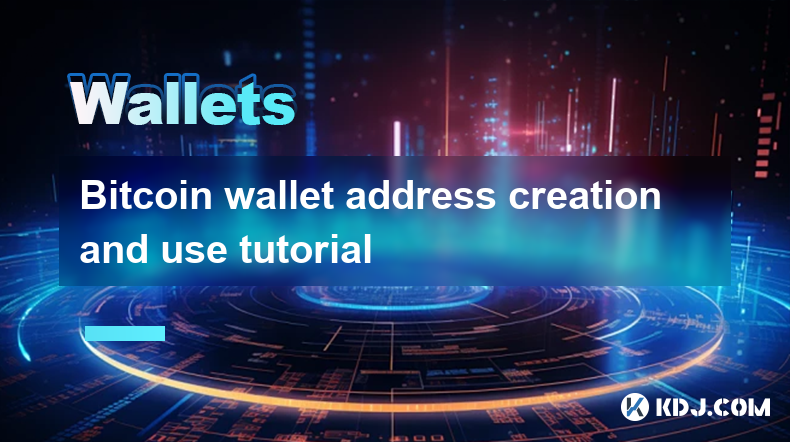
Bitcoin wallet address creation and use tutorial
Mar 29,2025 at 10:14pm
Understanding Bitcoin Wallet AddressesA Bitcoin wallet doesn't store Bitcoin in the way a traditional bank account does. Instead, it stores private keys, which are cryptographic secrets allowing you to access and spend your Bitcoin. Your Bitcoin address, on the other hand, is a public identifier, like an email address, that others can use to send you B...

Bitcoin address generation and secure storage guide
Mar 30,2025 at 08:07am
Understanding Bitcoin AddressesA Bitcoin address is essentially your public key, a string of alphanumeric characters used to receive Bitcoin. It's analogous to your bank account number. Unlike your private key, which is crucial for spending your Bitcoin, your address can be shared publicly without compromising your funds. Generating a new address is sim...
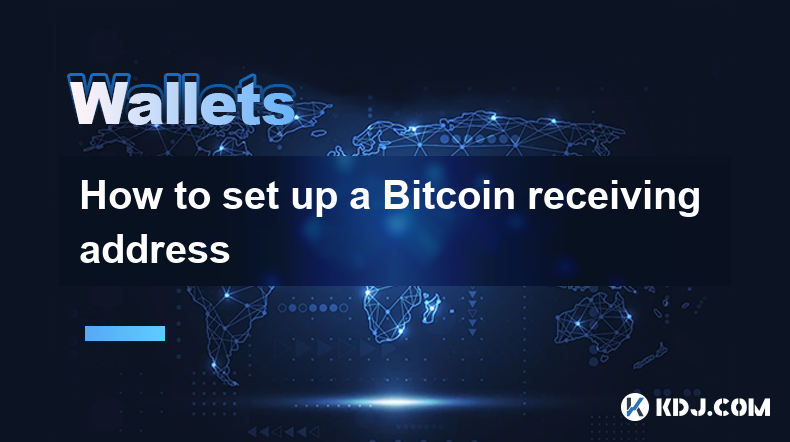
How to set up a Bitcoin receiving address
Mar 30,2025 at 06:14pm
Understanding Bitcoin Receiving AddressesA Bitcoin receiving address is essentially your unique identifier on the Bitcoin network. It's a string of alphanumeric characters that allows others to send Bitcoin to you. Think of it like your bank account number, but specifically for Bitcoin. You need a receiving address to receive Bitcoin. Crucially, you ca...

How to easily generate a Bitcoin payment address
Mar 29,2025 at 10:49am
Generating a Bitcoin payment address might seem daunting, but it's actually quite straightforward. This process is crucial for receiving Bitcoin, as each transaction requires a unique address. Understanding how this works is fundamental to using Bitcoin effectively. This guide will walk you through the simple steps, regardless of your technical experti...

Bitcoin address creation steps and common problems
Mar 30,2025 at 06:07am
Understanding Bitcoin AddressesA Bitcoin address is a unique identifier, similar to a bank account number, used to receive Bitcoin. It's a string of alphanumeric characters generated from a public key, derived from your private key. Understanding the distinction between public and private keys is crucial for Bitcoin security. Your private key should be...

How to make your own Bitcoin wallet address
Mar 29,2025 at 08:42pm
Creating your own Bitcoin wallet address is crucial for securing and managing your Bitcoin holdings. It allows you to independently receive and send Bitcoin without relying on third-party services. This process involves understanding the different types of wallets and choosing the one that best suits your needs and technical expertise. Incorrectly gene...

Bitcoin wallet address creation and use tutorial
Mar 29,2025 at 10:14pm
Understanding Bitcoin Wallet AddressesA Bitcoin wallet doesn't store Bitcoin in the way a traditional bank account does. Instead, it stores private keys, which are cryptographic secrets allowing you to access and spend your Bitcoin. Your Bitcoin address, on the other hand, is a public identifier, like an email address, that others can use to send you B...

Bitcoin address generation and secure storage guide
Mar 30,2025 at 08:07am
Understanding Bitcoin AddressesA Bitcoin address is essentially your public key, a string of alphanumeric characters used to receive Bitcoin. It's analogous to your bank account number. Unlike your private key, which is crucial for spending your Bitcoin, your address can be shared publicly without compromising your funds. Generating a new address is sim...

How to set up a Bitcoin receiving address
Mar 30,2025 at 06:14pm
Understanding Bitcoin Receiving AddressesA Bitcoin receiving address is essentially your unique identifier on the Bitcoin network. It's a string of alphanumeric characters that allows others to send Bitcoin to you. Think of it like your bank account number, but specifically for Bitcoin. You need a receiving address to receive Bitcoin. Crucially, you ca...
See all articles






















































































